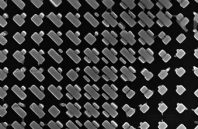Lenses are designed to work across a wide range of wavelengths and applications, from phone cameras to microscopes and sensors. Primarily they must be able to focus light regardless of its polarization.
Researchers have long believed that symmetric nanostructures such as circular pillars have been essential elements in the development of photonic devices that are not sensitive to polarization.
But now, researchers at the Harvard John A. Paulson School of Engineering and Applied Sciences (SEAS) have developed a polarization-insensitive metalens comprising non-symmetric nanofins that can achromatically focus light across the visible spectrum without aberrations.
Such a flat lens could be used for many applications from virtual or augmented reality headsets to microscopy, lithography, sensors, and displays.

 (585) 768-2513
(585) 768-2513

